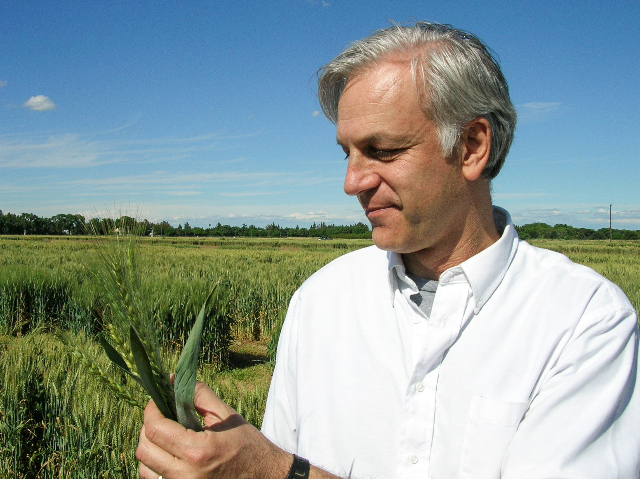UC Davis Professor Jorge Dubcovsky discovered a gene that can increase the nutritional value of wheat, and in January, was awarded the 2014 Wolf Prize in Agriculture.
The prize, which has been awarded since 1978, is one of six prizes established by the Wolf Foundation and is awarded once a year in Israel. The foundation’s website states that one of its main goals is “to award prizes to outstanding scientists and artists … for achievements in the interest of mankind and friendly relations among peoples.”
Dubcovsky and his team conduct their research using an applied breeding program that produces commercial varieties of wheat, which include things like pasta and bagels, and make up about 20 percent of the wheats grown in California.
“We discovered a gene that increased the amount of protein and iron that you have in the wheat grain,” Dubcovsky said. “This gene controls the remobilization of nutrients.”
Though the Wolf Prizes are usually each given to a single recipient, this year Dubcovsky shares the prize with Leif Andersson from Uppsala University in Sweden.
The foundation, according to its website, believes that Dubcovsky’s achievements are “truly impressive,” providing “groundbreaking contributions” to the field of wheat genetics.
“My program goes from very, very applied to very basic,” Dubcovsky said. “The focus of our research is on the genetics of the traits that contribute to develop better wheat: we study genes that improve quality and the nutritional value of wheat and that make wheat more resistant to biotic and abiotic stresses.”
Dubcovsky was born and raised in Argentina, and graduated from the University of Buenos Aires in 1984. He first came to Davis as a visiting scientist in 1992, but after returning to Argentina for a couple of years and finding it difficult to make a living, he moved to the United States and joined the UC Davis faculty in 1996.
“I enjoy it a lot here,” Dubcovsky said. “There are better opportunities for me. The system has more resources and is less corrupt. Argentina is a very nice place but we couldn’t make a living, and science wasn’t such a priority — that has changed a lot in recent years. That situation has gotten better for scientists, but when I came [to America] it was almost impossible for scientists [in Argentina].”
Dubcovsky currently teaches advanced statistics and an experimental design class at UC Davis. Previously, he taught undergraduate courses in molecular genetics and bioinformatics.
“I’ve had about 60 grad students every year for about 17 years — a lot of you!” Dubcovsky said. “I enjoy [being a professor], but I’m very passionate about my research also, so I like having time for that.”
Prior to receiving the Wolf Prize, Dubcovsky was also elected to the National Academy of Sciences (NAS) in 2013, where he has meetings with legislators to advise on plant breeding and on the need to train new plant breeders. His NAS responsibilities also include the revision of manuscripts for the Proceeding of the National Academy of Science (PNAS) as well as a general promotion of science and science education.
Tyson Howell, a fourth-year Ph.D. student in the Genetics Graduate Group, has been a student of Dubcovsky since March 2011.
“I think he is an excellent teacher with a passion for his work that really shows,” Howell said. “He has an in-depth knowledge of the subject matter, and endeavors to help students understand the material. It is clear that he takes teaching seriously and has a sincere interest in helping students learn the material for their own benefit, rather than just teaching so the students can pass a test.”
Howell specifically remembers a late meeting with Dubcovsky one evening in which the professor had to rush home after realizing mid-sentence that he was late for dinner.
“I’m sure he was hoping his wife hadn’t noticed he had stayed late in the lab yet again,” Howell said. “I remember this because it made me realize that he truly is passionate about his research, but he is also a husband and a father and has to balance many different aspects of his life, and I hope that in the future I can do as good a job of it as he does.”
Another Ph.D. student, fifth-year genetics and plant breeding major Rebecca Turner, has known Dubcovsky for six years now, works in his lab and said that she believes his Wolf Prize is definitely well deserved.
“From an undergraduate perspective, Jorge is an enthusiastic professor, who takes the time to present applicable material in a thorough way,” Turner said. “As a graduate student, he is a serious advisor, who imparts in his students a responsibility to report accurate results and to address relevant research questions.”
According to Turner, Dubcovsky’s work has resulted in the collaboration of public institutions across the country, creating resources for identifying genes and traits in wheat and barley breeding.
“These contributions have a global impact, as wheat is one of the top staple food crops in the world,” Turner said.
ELLIE DIERKING can be reached at features@theaggie.org.







